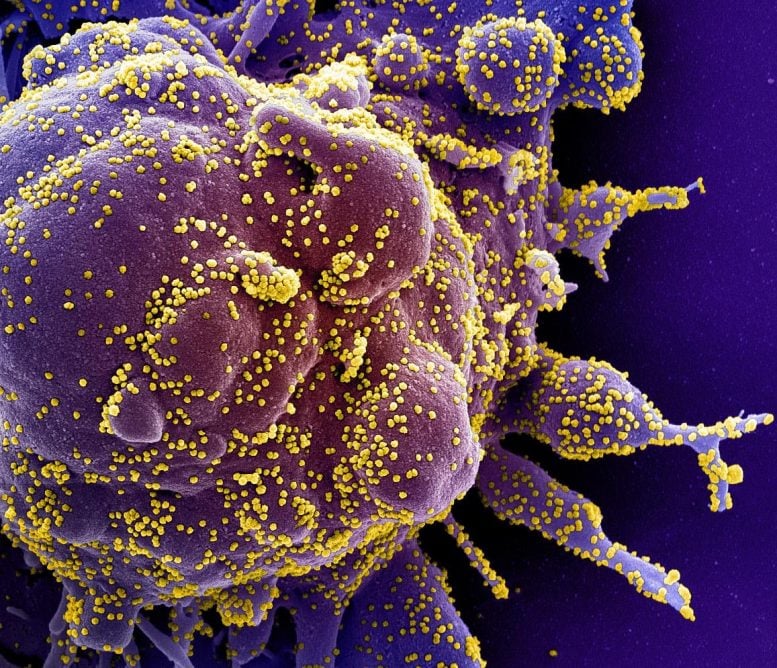
Results from a TGen-led international study suggest that SARS-CoV-2 takes advantage of genetic changes among patients with pre-existing lung diseases.
The results of a study by an international scientific team co-led by the Translational Genomics Research Institute (TGen), an affiliate of City of Hope, suggest that — like pouring water atop a wellhead before pumping — the airway cells of patients with chronic lung diseases are “primed” for infection by the COVID-19 virus, resulting in more severe symptoms, poorer outcomes and a greater likelihood of death.
The study — published today in Nature Communications — details the genetic changes caused by chronic lung disease in the molecular makeup of a variety of cells, including the epithelial cells that line the lungs and airways. The study details how those changes can help enable SARS-CoV-2, the virus that causes COVID-19, to enter the body, replicate, and trigger an out-of-control immune response that fills the lungs with fluids and often results in patients needing respirators and lengthy hospitalizations.
The team used single-cell RNA sequencing technology to spell out the genetic code of 611,398 cells from various databases, representing those with both healthy (control) lungs and those with chronic lung disease. Sequencing and analysis allowed researchers to identify molecular characteristics that may account for worse COVID-19 outcomes.
“Our results suggest that patients with chronic lung disease are molecularly primed to be more susceptible to infection by SARS-CoV-2,” said Nicholas Banovich, Ph.D., an Associate Professor in TGen’s Integrated Cancer Genomics Division, and one of the study’s senior authors. Dr. Banovich is a leading participant in the Human Cell Atlas Lung Biological Network, whose dozens of members, representing more than 80 institutions worldwide, also contributed to this study.
In addition, older age, male gender, smoking, and comorbidities such as high blood pressure, obesity, and diabetes, are all COVID-19 risk factors that are exacerbated by chronic lung diseases, such as Chronic Obstructive Pulmonary Disease (COPD), Interstitial Lung Disease (ILD), and especially Idiopathic Pulmonary Fibrosis (IPF), a progressive scarring and stiffening of the lung tissue.
“It was recognized early in the pandemic that patients with chronic lung diseases were at particularly high risk for severe COVID-19, and our goal was to gain insight into the cellular and molecular changes responsible for this,” said Jonathan Kropski, M.D., Associate Professor of Medicine and Cell and Developmental Biology at Vanderbilt University Medical Center, and a co-senior author of the study.
Changes in Lung Cells and Immune Cells
Researchers specifically searched for changes in AT2 cells, a major lung epithelial cell type, focusing on cellular pathways and expression levels of genes associated with COVID-19. They established a “viral entry score,” a composite of all genes associated with SARS-CoV-2, and found higher scores among cells from patients with chronic lung disease.
They also explored changes in immune cells and discovered dysregulated gene expression associated with hyper-inflammation and with sustained cytokine production, two signature symptoms of severe SARS-CoV-2 infection. So-called cytokine storms in COVID-19 patients unleash a cascade of immune cells that flood the lungs, causing severe organ damage.
“The genetic changes in immune cells, especially in specialized white blood cells known as T cells, may diminish the patient’s immune response to viral infection and lead to a higher risk of severe disease and poor outcomes in patients with chronic lung disease,” said Linh Bui, Ph.D., a post-doctoral fellow in Dr. Banovich’s lab, and one of the study’s lead authors.
“Our data suggest that the immune microenvironment at both the molecular and cellular levels in lungs damaged by chronic diseases may promote severe COVID-19,” Dr. Bui said.
Reference: “Chronic lung diseases are associated with gene expression programs favoring SARS-CoV-2 entry and severity” by Linh T. Bui, Nichelle I. Winters, Mei-I Chung, Chitra Joseph, Austin J. Gutierrez, Arun C. Habermann, Taylor S. Adams, Jonas C. Schupp, Sergio Poli, Lance M. Peter, Chase J. Taylor, Jessica B. Blackburn, Bradley W. Richmond, Andrew G. Nicholson, Doris Rassl, William A. Wallace, Ivan O. Rosas, R. Gisli Jenkins, Naftali Kaminski, Jonathan A. Kropski, Nicholas E. Banovich and Human Cell Atlas Lung Biological Network, 14 July 2021, Nature Communications.
DOI: 10.1038/s41467-021-24467-0
Significant contributions to this study were made by: Vanderbilt University Medical Center, Yale School of Medicine, Harvard Medical School, Baylor College of Medicine, and the Department of Veterans Affairs Medical Center. Plus several institutes in the UK, including: London’s Imperial College, Royal Brompton and Harefield National Health System Foundation Trust, Edinburgh University Medical School, and the Royal Infirmary of Edinburgh.
Major funding for this study — Chronic lung diseases are associated with gene expression programs favoring SARS-CoV-2 entry and severity — was provided by the National Institutes of Health, the Department of Defense, the Department of Veterans Affairs, and the Doris Duke Charitable Foundation.
Never miss a breakthrough: Join the SciTechDaily newsletter.